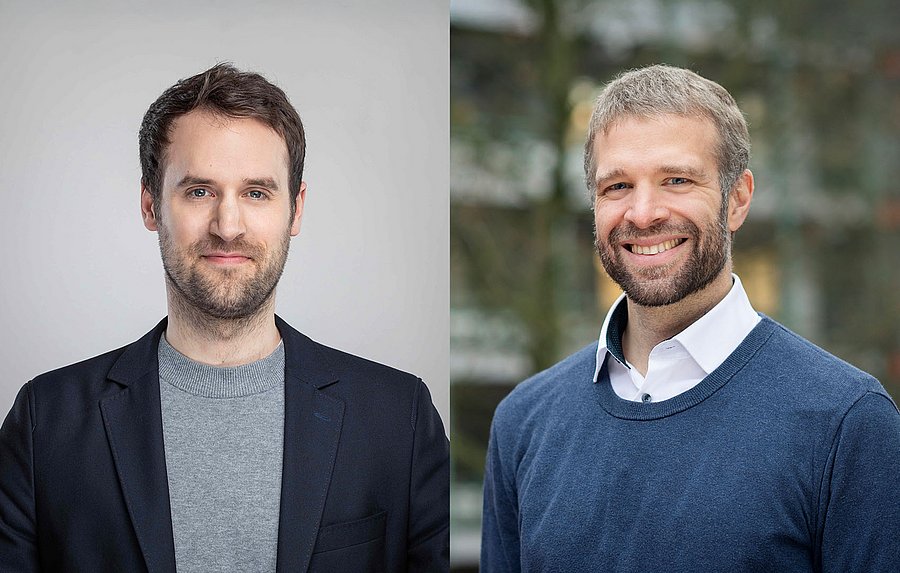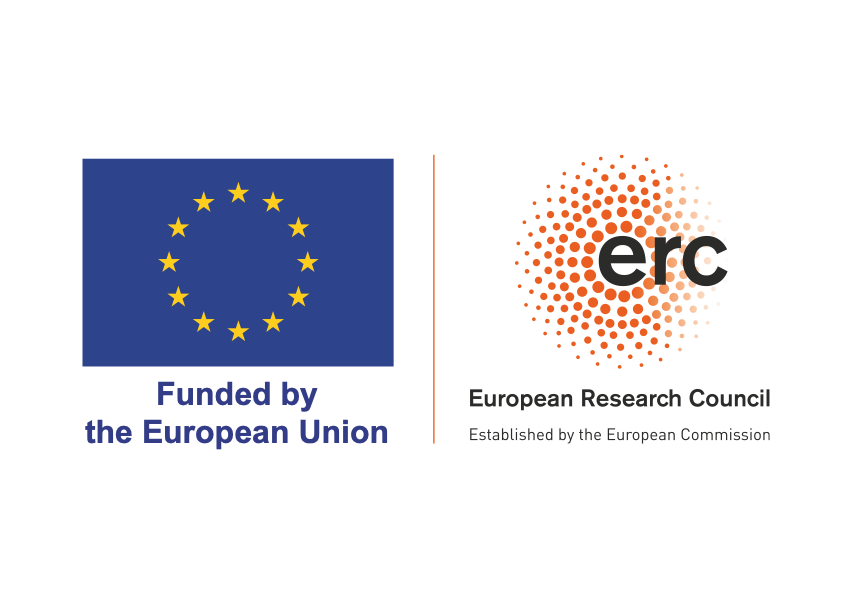Prestigious award
Two ERC Starting Grants for scientists at the University of Wuppertal

The ERC Starting Grant winners Junior-Prof Dr Mario Wiesenfeldt (left) and Prof Dr Philipp Trotter (right) from the University of Wuppertal can each look forward to millions in funding // Photos R. Baege (left) / Bettina Engel-Albustin (right)
"IntegrateEnergy" - funding for Prof Dr Philipp Trotter
Philipp Trotter is Professor of Sustainability Management at the University of Wuppertal. His research focusses on energy and innovation for sustainable development in sub-Saharan Africa and combines the disciplines of engineering, geography, social sciences and management.
As part of his Starting Grant, Trotter is developing a completely new approach to increase the effectiveness of energy programmes in Africa: the "IntegrateEnergy" project is developing a paradigm shift away from electricity access in isolation - i.e. the mere provision of electricity connections - towards the integration of energy supply into existing value chains. The integration of important key sectors such as agriculture, health, education and small businesses should enable a more efficient use of resources and lower losses in production and supply chains.
Over 570 million people in sub-Saharan Africa live without electricity. "Programmes from large donors such as the European Union, the World Bank and the African Development Bank invest billions in electricity connections, often without ensuring that the electricity is used specifically for productive and socially important applications. As a result, many systems remain underutilised, fail early or have a suboptimal impact on development work," reports Trotter. With his project, he wants to show how cross-sector synergies can be realistically and sustainably created on site.
Trotter and his team are focussing on local stakeholders from Uganda: using so-called co-production approaches, the acceptance, needs and requirements of integrative energy systems in various specific local contexts in Uganda are being researched in close cooperation with Ugandan stakeholders. "The findings are then translated into interactive, multi-criteria optimisation models to ensure the resource efficiency of the corresponding system designs," says Trotter, explaining the approach. Another objective is to identify political and institutional frameworks that enable and promote cross-sectoral cooperation. In order to identify barriers to implementation and strengthen cooperation between the energy, agriculture, health and education sectors, the researchers are conducting accompanying analyses, among other things.
IntegrateEnergy will also design innovative business and financing models in which revenues from profitable energy applications co-finance social and community-orientated projects.
"We expect the project to provide impetus for a reorientation of international energy programmes and UN Sustainable Development Goal 7 - away from pure energy access and towards energy for sustainable development," says Trotter.
"orthocat" - funding for Junior Professor Dr Mario P. Wiesenfeldt
Chemist Dr Mario P. Wiesenfeldt, who was previously employed at Ruhr-Universität Bochum, moved to the University of Wuppertal as a junior professor on 1 September and is setting up a research group in the school of mathematics and natural sciences as part of his ERC Starting Grant. His "orthocat" project aims to develop a new method that will be used primarily in medicinal chemistry in the future.
Drugs often consist of very complex chemical compounds. In order to produce them in a targeted manner, catalysts are needed - they act like tools that enable and accelerate chemical reactions.
These catalysts often consist of rare metals. However, these are becoming increasingly scarce on earth. In addition, certain active ingredients can easily slow down the metallic catalysts, and it is time-consuming to remove the sometimes toxic metal residues from the drug at the end. This costs time, money and generates a lot of waste.
The "orthocat" project is therefore looking for an alternative: catalysts that work entirely without metals. To ensure that these so-called organocatalysts work as efficiently as their metallic counterparts, Wiesenfeldt uses visible light as an energy source. In doing so, he pays attention to mild conditions, avoiding high temperatures, for example.
"The big challenge is selectivity. Most drug candidates have several possible reaction sites. Without targeted control, the reaction could start at the wrong site - and unusable by-products would result. In the project, we solve this by having the catalyst form a light-absorbing mini-compound, a so-called EDA complex, with only a very specific part of the molecule. This means that only this desired site reacts, the rest remains unaffected," explains Wiesenfeldt.
More background: ERC Starting Grant
In the current funding round, 3,928 project proposals were submitted, of which only just over 12 per cent (478) received funding. For their Starting Grants, the researchers initially receive funding totalling 1.5 million euros each. The money is made available over a period of five years .
The target group for ERC Starting Grants are excellent young researchers at the beginning of an independent career: researchers of all nationalities with two to seven years of professional experience since completing their doctorate, a promising scientific career and an outstanding research project can apply. ERC Starting Grant calls are open to all topics and disciplines. Applications are judged solely on the criterion of scientific excellence.
Further facts, figures and background information: https://erc.europa.eu/news-events/news/erc-2025-starting-grants-results (ERC press release dated 4 September 2025)

